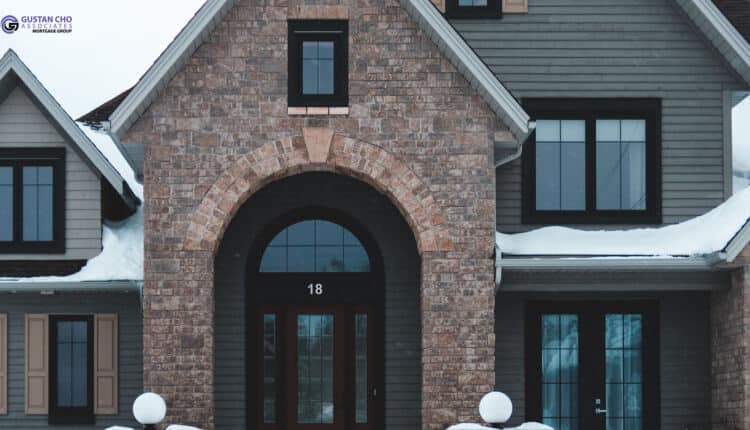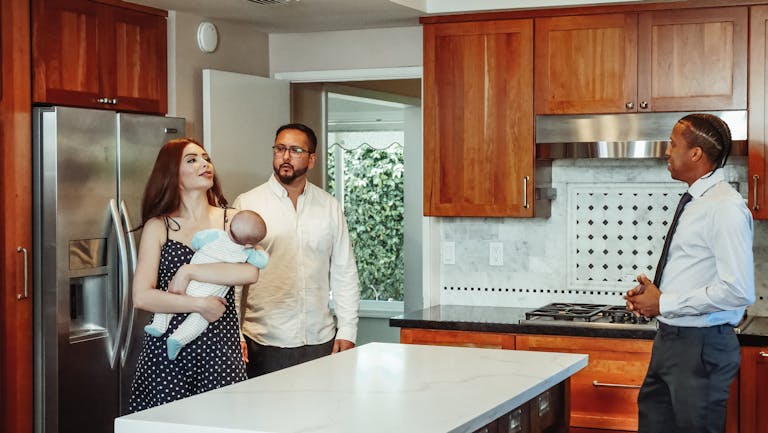Steps To Buying a House For First-Time Homebuyers
Buying your first home is an exciting achievement but can also feel overwhelming. Understanding the process and preparing can make your homebuying journey smooth and stress-free. In this article, we will cover and discuss the essential steps to buying a house for first-time homebuyers with little to no down payment and low closing costs. Before we start the steps to buying a house, we will discuss what you need to do to get ready for the steps to buying a house and going through the mortgage process.
Mortgage Loan Options For First-Time Homebuyers
Purchasing your first home is a meaningful milestone, and choosing the right mortgage loan is one of the essential steps to buying a house. Here are the most common mortgage loan programs available to first-time homebuyers.
- Conventional Loans – Conventional loans are privately funded and not insured by any government agency. They generally require a down payment of at least 3% and a higher credit score. These loans are best for borrowers with strong credit histories and stable incomes.
- FHA Loans (Federal Housing Administration Loans) – FHA loans are famous among first-time homebuyers because they only need a lower down payment, as low as 3.5% and their credit score requirement is as low as 580. The government insures these loans.
- VA Loans (Veterans Affairs Loans) – VA loans are available to eligible military service members, veterans, and spouses. They require zero down payment, no private mortgage insurance (PMI), and competitive interest rates.
- USDA Loans (United States Department of Agriculture Loans) – USDA loans cater to homebuyers looking to purchase in qualified rural and suburban areas. They require zero down payment and offer competitive interest rates.
- First-Time Homebuyer Assistance Programs – There are states and local governments offer first-time homebuyer assistance programs that gives down payment assistance, grants, or lower interest rates. These programs vary by location, so it’s essential to research what’s available in your area.
- Fixed-Rate vs. Adjustable-Rate Mortgages (ARMS)
- Fixed-rate mortgages have a stable interest rate and predictable monthly payments for the life of the loan (typically 15 or 30-based).
- Adjustable-rate mortgages (ARMs) have initial interest rates lower than Fixed-rate mortgages that adjust periodically after a fixed period (e.g., 5/1 ARM means a fixed rate for five years, then annual adjustments).
- Portfolio Loans – Portfolio loans are provided by private lenders who keep them in their portfolios rather than selling them to investors. These loans may have more adjustable credit and income requirements but often have higher interest rates.
- Bank Statement Loans – Bank statement loans allow self-employed borrowers to be qualified based on bank deposits instead of traditional income verification. This is useful for freelancers and business owners who may not have W-2s.
First-Time Buyer? Find Low Down Payment & Flexible Credit Mortgage Loans
See What First-Time Buyer Loan Programs You Qualify For!
The Steps To Buying a House and The Mortgage Process
We will be covering the various steps to buying a house for first-time homebuyers, From getting qualified, to getting pre-approved, writing an earnest money check, entering into a real estate purchase contract, and the beginning of the mortgage process. You will learn the basic steps of the mortgage process, and the documents that are required from the mortgage processor. The role of the mortgage processor and the mortgage underwriter will also be covered.
The Road of the Mortgage Process Leading to a Clear to Close
One of the most important steps to buying a house is to understand the mortgage process leading to a clear to close. You will learn the steps to buying a house and each phase of the mortgage process leading to a clear to close. Homebuyers will learn what a conditional mortgage loan approval is, the conditions from the underwriter, and the mortgage processor submitting the conditions for a clear to close. The clear to close is when the lender issues a commitment to prepare the closing docs and is ready to fund the loan.
How To Avoid Stress During The Mortgage Process?
If you understand the mortgage process and the steps to buying a house, you will avoid stress during the whole process. The mortgage process does not have to be stressful. The main reason for stress during the mortgage process is that the loan officer did not write a fully qualified pre-approval.
Steps To Buying a House and What To Expect During The Home Buying and Mortgage Process
Buying a house may seem like a painful process: it can be the purchase of your most expensive and emotionally loaded life. The pandemic did not slow low the demand for homes. And buying your first house can feel simultaneously exciting and overwhelming.
Mortgage Rates Versus Credit Scores
The higher your credit scores the more home you can pay comfortably. You will not need a perfect loan to buy a house. In some mortgage programs, like FHA and VA loans, you can qualify for a home loan with a 500 credit score. But many lend will want to see a credit score of 620 or more. And credit scores greater than 740 will give you the lowest rates and best terms.
Down Payment on a Home Purchase
Most first-time homebuyers are under the impression they need a 20% down payment to purchase their first home. This is not the case. VA and USDA loans do not require any down payment. FHA loans require a 3.5% down payment with you having at least a 580 credit score.
Mortgage Loans With Credit Scores Down To 500 FICO
You can qualify for an FHA loan with credit scores down to 500 FICO. If your credit scores are under 580 and down to a 500 FICO, HUD, the parent of FHA, requires a 10% versus a 3.5% down payment. You can get a VA loan with credit scores down to a 500 FICO. Non-QM loans require a 20% down payment.
Jumbo and Non-QM Mortgage Loans
Jumbo loans require a 20% down payment. Contrary to popular belief, an initial payment of 20% is not necessary to buy a house. Most people leave much less. Since 2018, the typical initial payment of housing buyers for the first time has oscillated between 6 and 7 percent.
Steps to Buying a House: Down Payment Requirements
A substantial deposit will give access to the best mortgage offers and cheaper mortgage rates. It is possible to find a mortgage with a down payment requirement between zero to 5%. Higher down payment will yield a lower monthly housing payment and lower rates.
Government-Backed and Conventional Loans
There are low down payment mortgage options for buyers for the first time, starting at 3% or even zero down. Mortgage loans backed by the Government as it goes, USDA, VA, and FHA require between 0-3.5% down payment. They are conforming to only a 3% down payment for first-time homebuyers. Therefore, do not postpone the purchase plans of your home, thinking that you need to save 20% or invest all your savings in the initial payment. Explore all your mortgage options and speak with a loan officer about whether a zero or low-payment loan makes sense for you.
Steps to Buying a House: Closing Costs
The down payment on a home purchase is not the only thing that you need to save. It is important to remember that your down payment is not the only cost when buying a house. Unless you can negotiate your rates to be covered by the seller, you must also save money for closing costs. Average closing costs vary from 3% to 5% of the loan amount. That means for a $ 250,000 house with a 3% closing cost, you must save approximately $ 7,200 to $ 12,100 per closing cost.
Seller Concession and Lender Credit For Closing Costs on Home Purchase
Most of our homebuyers do not have to worry about coming up with closing costs. Closing costs can be covered with a seller concession or a lender credit. The closing costs can also be paid with the combination of closing costs and lender credit. Lender credit is when the lender will give the borrower credit for closing costs in lieu of a higher rate.
Not Sure Which Loan Is Right for You? Get Expert Help Finding the Best First-Time Buyer Mortgage
Talk to a Mortgage Expert & Find the Best Loan Option for You!
How Mortgage Lenders Price Rates on Home Loans?
Mortgage rates are based on the borrower’s credit scores and loan-level pricing adjustments. Loan-level pricing adjustments also referred to as LLPAs, are pricing hits to the par rate on a home loan. Loan-level pricing adjustments depend on the risk level the lender needs to take such as credit scores, type of property, loan-to-value, debt-to-income ratio, and loan size.
Typical Closing Costs on Home Purchase
Closing costs vary depending on a series of factors, including the property’s value, the size of its loan, transfer stamps, origination fees, title charges, and the requirements on the status and municipality. Some common closing costs associated with a home purchase include recording fees, transfer stamps, origination fees, processing fees, underwriting fees, credit reporting fees, discount points, attorney’s fees, third-party charges, pre-paid, and any other costs and fees associated with the closing of the home loan.
Pre-Paid
The “Prepaids” are escrow of PITI, homeowners insurance, property taxes, homeowners association, and mortgage insurance premiums. Lenders often require between 6 and 12 months of taxes and insurance when you buy a house.
Steps to Buying a House: How Much Home Can You Afford?
It is important to budget all your housing costs. When budgeting for a house’s payment, knowing the real costs of having your new home is important. Its total monthly payment will include more than the main and interest on the mortgage loan. It also includes monthly installments for property taxes and housing owners, as well as HOA installments if you buy within an association of owners.
Calculate Your Monthly PITI and Debt-To-Income Ratio
A good first step is using a mortgage calculator with taxes and insurance to estimate your monthly payment.
Keep the ongoing cost of home maintenance. This could include furniture and decoration, grass care, maintenance of appliances, renovations, and maintaining an emergency fund in case unexpected repairs arise after moving. Finally, do not forget to consider the costs of public services such as electricity, gas, water, and sewerage. Make sure to get qualified and pre-approve by a mortgage lender before hunting houses. Getting qualified and pre-approved for a mortgage may be less attractive than touring houses. But being completely approved before house hunting is vital.
Steps to Buying a House: Getting Qualified and Pre-Approved
Getting qualified and pre-approved makes buying a house less stressful. The process before approval will confirm that its price and qualifications range are in line with lenders’ guidelines. It will also provide invaluable information, such as its estimated interest rate and the payment of the mortgage, which will help with the budget and planning before purchasing your home. Qualify for mortgage with us , click here
How Long Does It Take To Get Pre-Approved For a Mortgage?
Fortunately, the mortgage qualification and pre-approval process are fast and simple. Sometimes, it should be done in just 24-48 hours. The start of pre-approval process starts with completing an online application. The loan officer will need to see income and assets documents.
Steps to Buying a House: Hiring a Real Estate Agent To Shop For Homes
The buyer’s real estate agent can show the buyer homes that meet their needs. Hire a realtor who knows the area and neighborhood inside and out. Look at neighborhoods, schools, shopping, and proximity to expressways, and study the crime statistics. This will be fundamental in the price negotiations and will prepare their purchase contract. Your agent will help you prepare the most competitive offer possible within your budget and terms.
Steps to Buying a House: Shopping For Best Rates and Terms on a Home Purchase
According to the Consumer Financial Protection Office (CFPB), shopping for a mortgage from more than one mortgage lender can save thousands of dollars during the useful life of your mortgage loan. And with the ability to rapidly online estimates from many lenders, this is an easy way to save on the mortgage rates paid to the lender to reduce their interest rate.
Entering Into a Real Estate Purchase Contract
Home sellers and the seller’s real estate agent require the homebuyer has a solid pre-approval letter before accepting a purchase offer on a house. Therefore, the qualification and pre-approval steps are not just useful but rather necessary to be able to get an executive home purchase contract.
Buying Down The Rate With Discount Points
Buying the rate can make sense if you can get enough seller concessions. One discount point is equivalent to 1.0% of the mortgage loan amount. Buying down the rate with discount points can be paid with seller concession. If you plan on staying in your home for five years or longer, it may make sense to buy down the rate with discount points.
Comparing ARMs Versus Fixed-Rate Mortgages
If you are buying a starter home and plan on moving in the very near future, buying down the rate may not make sense. If you are buying a starter home and plan on upgrading to a larger home within the next five years, you should explore going with an adjustable-rate mortgage versus a fixed-rate mortgage. ARMs generally have lower rates versus fixed-rate mortgages. Verify each of the estimates of your loan to see if the discount points are included in the listed rates, and you are sure to compare the offers with similar conditions.
Lower Initial Payments or Long-Term Stability?
Apply Now And Find Out Which Loan Fits Your Goals!
Tips for a Smooth Home Buying Process
- Stay Organized: Keep all documents, such as financial statements, inspection reports, and correspondence with your agent and lender, in one place.
- Communicate Clearly: Communicate openly and clearly with your real estate agent, lender, and other professionals involved in the process.
- Be Patient. The home-buying process can take time. Stay patient and be prepared for possible delays or challenges.
Frequently Asked Questions (FAQs)
1. What are the first steps to buying a house?
Assess Your Finances: Review your credit score, savings, and overall financial health.
Determine Your Budget: Evaluate your income, existing debts, and available down payment to determine the house you can afford.
Get Pre-Approved for a Mortgage: A lender needs a pre-approval letter to assess your borrowing capacity and prove to sellers that you are a serious buyer.
2. How do I pick the right real estate agent?
One of the crucial steps to buying a house is picking the right real estate agent. Below are the tips you can follow:
Research and Referrals: Seek advice from friends and family and read reviews online.
Interview Multiple Agents: Meet with several agents. Find someone who understands your needs and has experience in your desired market.
Check Credentials: Confirm that the agent is licensed and has a proven track record.
3. What should I look for in a home?
Location: Consider the neighborhood, school districts, and proximity to work and amenities.
Size and Layout: Consider your current needs and future plans, such as family size and lifestyle preferences.
Condition: Assess the home’s age, maintenance history, and potential renovation costs.
4. How do I make an offer on a house?
Consult Your Agent: Your agent will help you determine a fair offer by considering comparable sales and market conditions.
Include Contingencies: Common contingencies include financing, home inspection, and appraisal.
Submit a Written Offer: Your agent will submit your offer to the seller’s agent. Be prepared for possible counteroffers.
5. What happens during the home inspection?
One of the steps to buying a house is the home inspection. Your agent can recommend a qualified home inspector.
Attend the Inspection: Attending the inspection enables you to ask questions and grasp potential issues.
Review the Report: The inspector will provide a detailed report on the home’s condition, including any necessary repairs or maintenance.
6. Steps to buying a house; What is the closing process?
Final Walkthrough: Conduct a final inspection of the property to confirm it is in the agreed-upon condition.
Closing Disclosure: Examine the closing disclosure document, which details the final terms of your loan and the closing costs.
Sign Documents: On closing day, you’ll sign the necessary paperwork, pay any remaining costs, and receive the keys to your new home.
7. How much money do I need for a down payment?
Down Payment Amount: The down payment typically varies from 3 to 20 percent of the cost, depending on the kind of loan and lender requirements.
Down Payment Assistance: Explore programs that offer grants or loans to help with your down payment.
8. What are closing costs, and how much should I expect to pay?
Definition: Closing costs are fees for finalizing your mortgage, including appraisal, title insurance, and attorney fees.
Amount: Closing costs generally range from 2% to 5% of the loan amount.
9. What is private mortgage insurance (PMI)?
Purpose: If your down payment is less than 20% of the home’s purchase price, PMI is needed to protect the lender in case of default.
Cost: PMI premiums vary but are typically added to your monthly mortgage payment.
10. Steps to buying a house: How can I increase my credit score?
Pay Bills on Time: Consistently paying your bills on time positively impacts your credit rating.
Reduce Debt: Reduce your credit card balances and avoid taking on new debt.
Check Your Credit Report: Review your credit report for errors and dispute any inaccuracies.
11. What types of mortgage loans are available for first-time homebuyers?
Conventional Loans: Generally require higher credit ratings and larger down payments but provide competitive interest rates.
FHA Loans: Supported by the FHA, these loans require a lower down payment and credit rating.
VA Loans: These loans, available to veterans and active-duty military, offer favorable terms and require no down payment.
USDA Loans: These loans provide low interest rates and no down payment options for rural homebuyers.
12. How long does it take to buy a house from start to finish?
There are several steps to buying a house. The entire process can span from a few weeks to several months, depending on market conditions, loan processing times, and negotiation durations.
13. What should I avoid during the home-buying process?
New Debt: Avoid taking on new debt, such as car loans or credit cards, as it can affect your mortgage approval.
Job Changes: Try to maintain stable employment, as changes can impact your loan qualification.
Large Purchases: Refrain from making significant purchases that could deplete your savings needed for the down payment and closing costs.
For more information on steps to buying a house for first-time homebuyers, you can call GCA Mortgage Group at 800-900-8569 or text us for a faster response. You can also email us at alex@gustancho.com. Our expert Loan Officers are available even during weekends and holidays!
First-Time Buyer? Discover Government & Conventional Loans Designed Just for You
Find Out How First-Time Homebuyer Loans Can Help You Qualify








